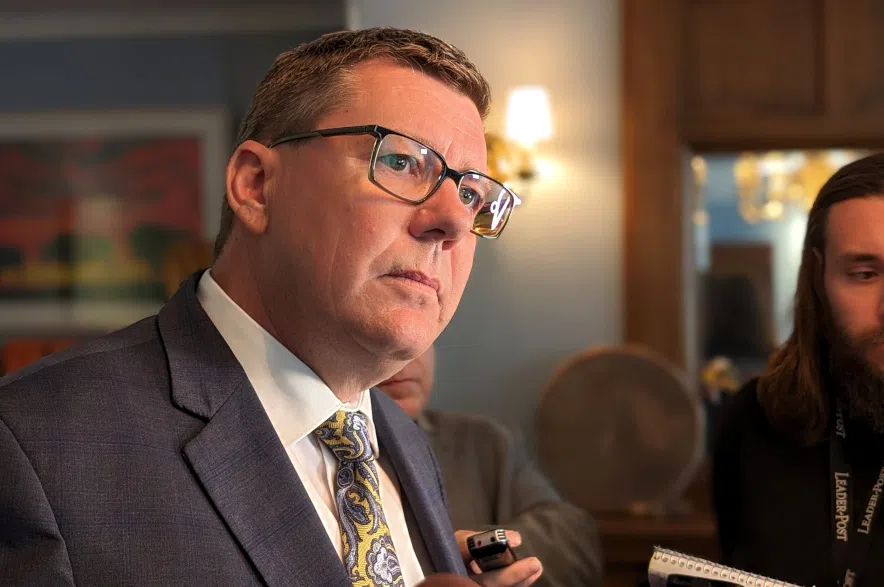With the legislative session set to end on Thursday, Premier Scott Moe turned his eyes to the federal government this week, sending a letter to Prime Minister Mark Carney.
The letter he posted to social media on Wednesday afternoon laid out 10 policy changes he said “the federal government must make to reset Ottawa’s relationship with Saskatchewan.”
The letter said Moe and Carney had discussed these changes, and that the federal government has the ability to move forward on all of them quickly, “which would clearly signal a new, more positive relationship between Saskatchewan and the federal government than we have had for the past 10 years.”
I have written to PM @MarkJCarney outlining our “Strong Saskatchewan, Strong Canada Plan” – 10 key policy changes the federal government must make to reset Ottawa’s relationship with Saskatchewan.
The PM has the ability to move forward on all 10 of these items quickly, which… pic.twitter.com/wLsNlls5pV
— Scott Moe (@PremierScottMoe) May 14, 2025
Moe’s letter lays out the list:
1. Begin negotiations immediately to have China remove tariffs on Canadian agri-food products
There has been a 100 per cent tariff on a handful of Canadian products, including canola oil and meal, since March, in retaliation for a 100 per cent Canadian tariff on Chinese-made electric vehicles.
2. Introduce bail reform and stronger penalties to deal with new street drugs
The provincial government has been introducing its own changes to try to deal with an increase in methamphetamine and fentanyl in the province, as well as the crime that has risen in its wake.
3. Stop trying to collect the carbon tax on home heating from Saskatchewan
The province stopped collecting the tax on home heating in 2024 as a response to the Trudeau Liberal government removing the tax from home heating oil – Moe claiming it was about fairness. The letter states this would be a move in line with the recent “full removal of the carbon tax” when Carney’s government brought the consumer carbon tax down to zero.
4. Transfer responsibility for the output-based pricing system for heavy emitters, also known as the industrial carbon tax, to the provinces “to ensure measures consider each province’s unique industrial structure, economic realities and trade exposure”.
Saskatchewan administers its own output-based pricing system for heavy emitters, a pricing which Moe’s government brought down to zero in April in anticipation of the federal election. The Conservative party had promised to get rid of the industrial pricing, the Liberal platform didn’t.
5. Repeal the Clean Electricity Regulations and extend the life of coal power plants
Moe’s government has long been against the Clean Electricity Regulations, saying it’s the targets just aren’t possible for Saskatchewan’s power grid, and in January his government said it would look to extending the life of its coal power plants.
6. Repeal the Oil and Gas Emissions Cap “to create investment certainty and secure the supply of Canadian energy products, some of the most sustainable in the world”
In September last year, the province’s economic assessment tribunal came out with a report, saying the emissions cap and the federal methane regulations would both be deeply harmful to the province’s economy.
In March, Carney said his government would keep the emissions cap on oil and gas production, but would push for investment in carbon capture to meet emissions targets.
7. Build trade and economic corridors across the country and remove legislation that impacts the movement of Western Canadian goods
Since the trade war with the U.S. got started, talk has been rising about strengthening trade across Canada. In March, the province announced it would be working to reduce interprovincial trade barriers, reviewing its own regulations, and trying to boost interprovincial trade.
8. Restore the investment climate and streamline the federal approval process to allow major projects to proceed
9. Expand pipeline capacity in Canada
Pipeline capacity has been a frequent refrain from Saskatchewan and Alberta’s premier through the U.S. trade war, saying there’s a need to move product east and west, instead of south through the U.S., to get to more markets.
10. The last of the priorities on the list was to reform the Impact Assessment Act to cut red tape and streamline the process to both avoid duplication and infringement on provincial jurisdiction
The Saskatchewan Government has had complaints for years about the federal government straying into things it believes are provincial jurisdiction, going so far as to pass the Saskatchewan First Act, which amended the province’s constitution to assert Saskatchewan’s “exclusive” jurisdiction in some areas.
The letter ended with Moe saying he and his government are ready to do the work to move Canada and Saskatchewan forward together.
He also invited Carney to an in-person meeting to discuss the list “as soon as you are able to further this work”.
The letter was posted to social media so there was no opportunity for Moe to answer questions about it. He was expected to be available to media Thursday morning.











